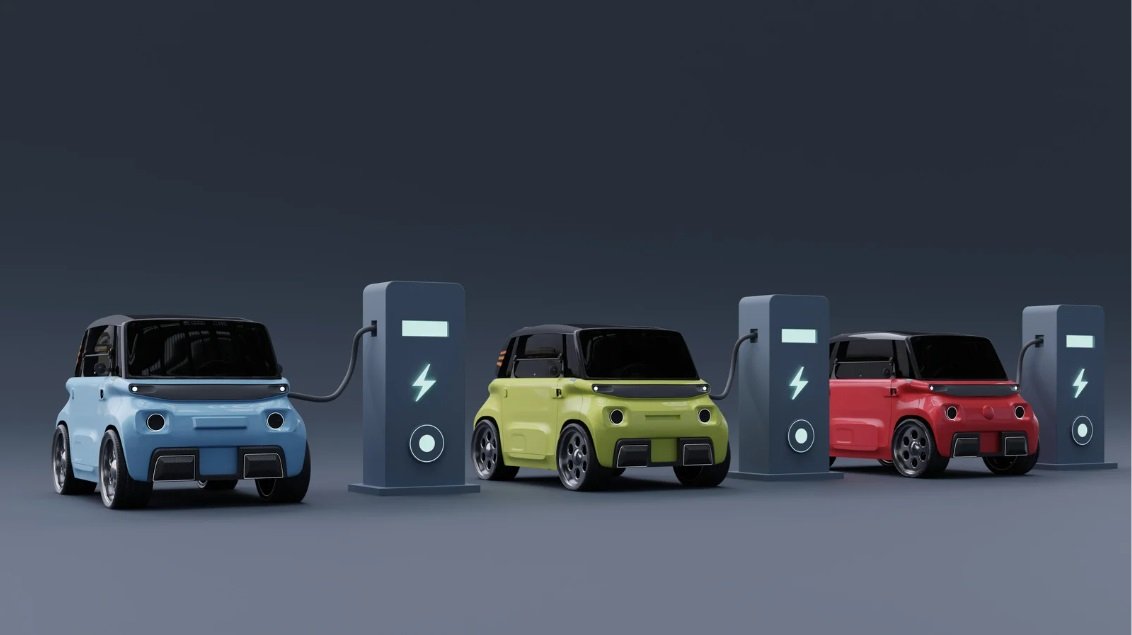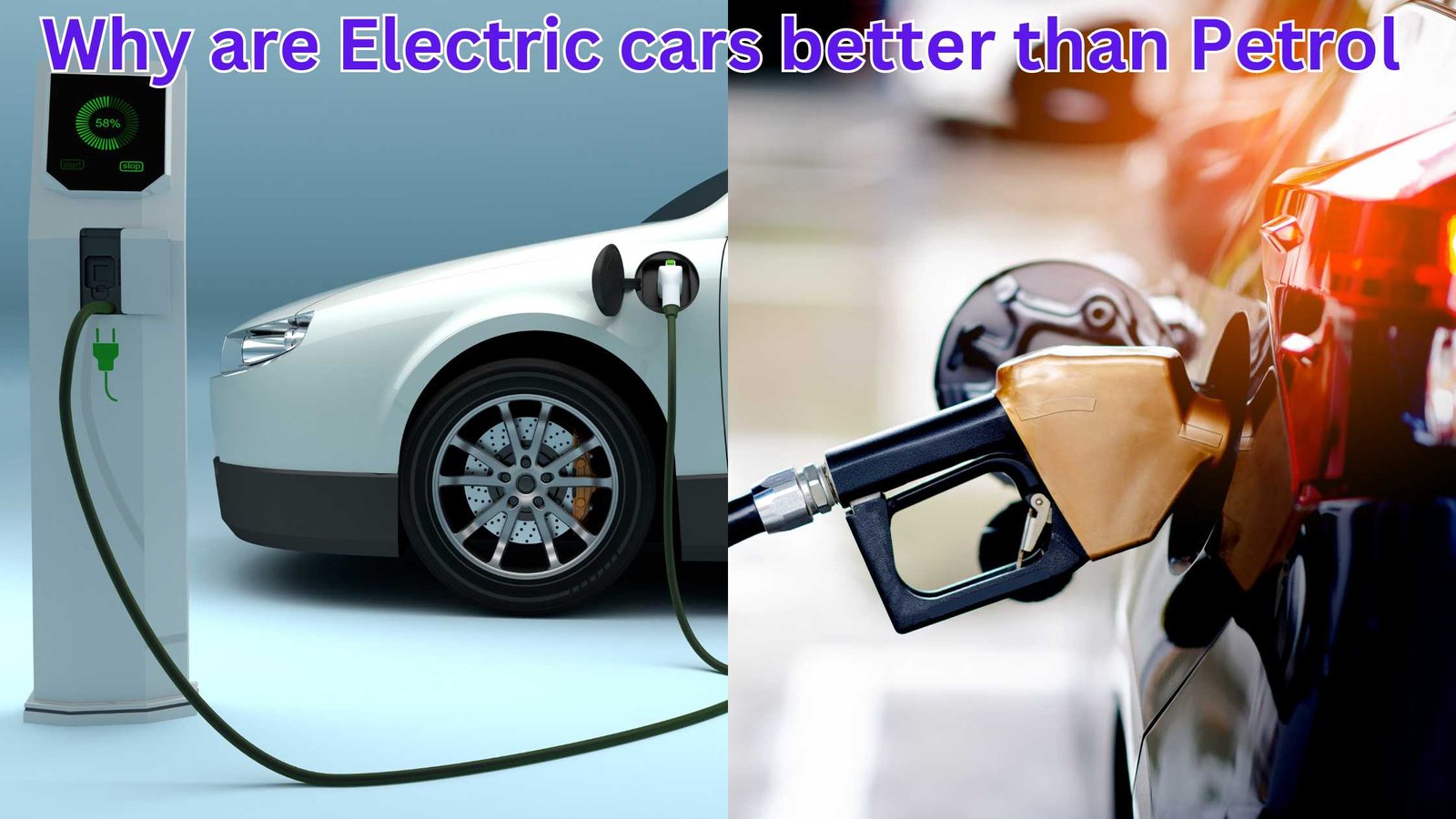Remember those awesome remote-control cars that zoomed around the house? Imagine a car that runs quietly, super smoothly, and costs way less to use than those battery hogs (but a million times cooler, for sure!). That’s the magic of electric cars (EVs)! They’re the future of transportation, and here’s why they might be even better than petrol cars.
How Do They Work?
Unlike petrol cars that chug on gasoline, EVs have electric motors powered by big, rechargeable batteries. Think of them like giant phone batteries! Instead of smelly exhaust fumes, they puff out clean air – pretty cool, right?

10 Advantages of Electric Vehicles
- Eco-Warriors: EVs don’t pollute the air, making them superheroes for our planet!
- Save Cash, Save Earth! Filling up your electric car with electricity usually costs less than filling up a petrol car with gas, so you’ll save money on fuel!
- Peace and Quiet: EVs are super silent, making your rides peaceful and easy on the ears.
- Speedy Starts: Electric motors give EVs instant power, so they zoom off the line quickly!
- Bye-Bye Oil Changes! EVs have fewer moving parts, meaning less maintenance and fewer trips to the mechanic.
- Government Goodies: Many countries offer tax breaks and special deals for buying EVs.
- Power Players: Electric cars can be just as fast and powerful as petrol cars.
- Tech Toys: EVs are often packed with the latest technology and cool features.
- Charge at Home: Imagine “refuelling” your car overnight at home – convenient and cost-effective!
- Future Focus: By going electric, you’re helping create a cleaner and more sustainable world.
10 Disadvantages of Electric Vehicles
- Limited Range: While improving, some EVs can’t travel as far as a petrol car on a single charge.
- Charging Times: Charging an EV can take longer than filling up a petrol car, depending on the charger.
- Higher Upfront Cost: EVs can be more expensive to buy than petrol cars initially.
- Fewer Charging Stations: There aren’t as many charging stations as gas stations yet, especially in remote areas.
- Battery Worries: Replacing an EV battery can be expensive, though they typically last for many years.
- Not Ideal for Everyone: If you take long road trips often, an EV might not be the best choice (yet!).
- Weather Woes: Extreme cold weather can reduce an EV’s range.
- The Power Grid: If electricity comes from dirty sources like coal, EVs might not be as eco-friendly.
- Recycling Challenges: Recycling EV batteries is a developing technology.
- The Sound of Silence: Some people miss the rumble of a petrol engine!
Electric and Petrol Cars Comparison
Petrol Cars: The OG Ride
Petrol cars, also called gasoline cars, have been around for ages. They run on petrol (gas), which burns in an engine to make the car move. We all know the sound of a petrol engine – that familiar rumble!
Pros:
- Plenty of Stations: Filling stations are everywhere, so you can easily refuel on long trips.
- Fast Refueling: Filling a petrol car’s tank takes just a few minutes, perfect for impatient drivers (or those with hangry passengers!).
- Wider Range: Petrol cars can typically travel much farther on a single tank than most electric cars can on a single charge.
Cons:
- Pollution Problem: Burning petrol creates harmful fumes that pollute the air we breathe – not good for the environment!
- Regular Maintenance: Petrol cars have more moving parts, meaning more frequent oil changes and mechanic visits.
- Fuel Costs Fluctuate: Petrol prices can go up and down a lot, making it hard to budget for fuel costs.
Electric Cars: The Future is Now!
Electric cars are the new kids on the block, but they’re gaining popularity fast! Instead of a petrol cars engine, they have electric motors powered by big, rechargeable batteries. Think of them like giant phone batteries, but for cars!
Pros:
- Eco Champs: EVs don’t create any pollution, making them superstars for a cleaner planet!
- Save Money, Save Earth!: Electricity is generally cheaper than petrol, so you can save cash on fuel costs.
- Silent Speed: EVs are super quiet, making rides peaceful and good for your ears.
- Instant Zoom: Electric motors provide instant power, giving EVs a lightning-fast pick-up!
- Less Maintenance: EVs have fewer moving parts, meaning fewer trips to the mechanic.
Cons:
- Charging Challenges: There aren’t as many charging stations as gas stations yet, especially on long journeys.
- Charging Time: Filling up an EV takes longer than filling up a petrol car (think hours, not minutes).
- Higher Upfront Cost: EVs can be more expensive to buy than petrol cars at first.
- Limited Range: While improving, some EVs can’t travel as far as a petrol car on a single charge.
So, Which Car Wins?
The truth is, it depends on your needs! Petrol cars are great for long trips and readily available refuelling, while EVs are amazing for eco-conscious drivers who want a quiet, potentially cost-effective ride.
The good news? Technology is constantly improving! As charging stations become more common and EV ranges increase, electric cars might just become the future of transportation.
The Choice is Yours!
Whether you’re a petrol pro or an electric enthusiast, the most important thing is to choose a car that fits your lifestyle and helps protect our planet. So, buckle up, do your research, and get ready for the ride of the future!
Conclusion
Electric cars are the future, offering a clean, quiet, and potentially cost-effective driving experience. They’re good for your wallet and the planet. So, next time you’re thinking about a car, consider making the switch to electric – it could be a win-win!
Frequently Asked Questions
Q) Can electric cars go long distances?
A) While some early models had limited range, newer EVs can travel hundreds of kilometers on a single charge.
Q) How long does it take to charge an electric car?
A) Charging times vary depending on the car and charger type, but it can range from 30 minutes to several hours.
Q) Are electric cars expensive?
The upfront cost of EVs can be higher than petrol cars, but government incentives and lower running costs can even things out in the long run.
For more technology updates follow our blog Get Tech Updates
